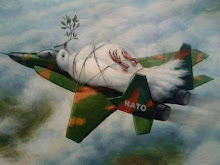Organizing Notes
Bruce Gagnon is coordinator of the Global Network Against Weapons & Nuclear Power in Space. He offers his own reflections on organizing and the state of America's declining empire....
About Me

- Name: Bruce K. Gagnon
- Location: Brunswick, ME, United States
The collapsing US military & economic empire is making Washington & NATO even more dangerous. US could not beat the Taliban but thinks it can take on China-Russia-Iran...a sign of psychopathology for sure. We must all do more to help stop this western corporate arrogance that puts the future generations lives in despair. @BruceKGagnon
- Americans, you’re being played....
- 5G impacts on human health
- Calling out the EU's leading appointed fascist
- Netanyahu claims protests support barbarism
- BIW deep into war on Palestine & Yemen
- History lesson: 'America's role in the world is se...
- Tucker interviews Jeff Sachs
- No democracy here....
- Australian Labor Party suspended senator for vote ...
- Lebanese FM warns escalation with Israel to drive ...
Please like us on facebook
Please like us on facebook

Please help us by making an online donation

![]()

Please help us by making an online donation

